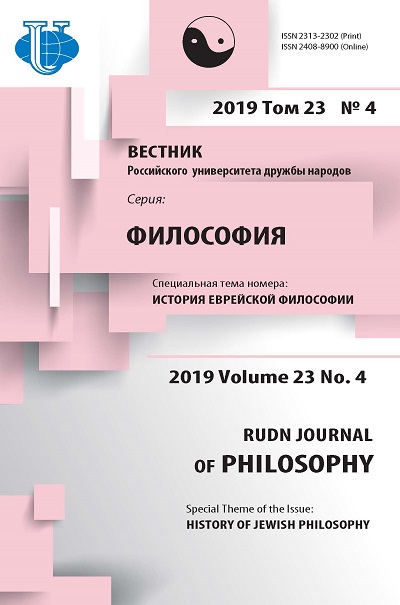The Concept of Virtue in Religious Philosophy of Hermann Cohen
- Authors: Sokuler Z.A.1
-
Affiliations:
- Lomonosov Moscow State University
- Issue: Vol 23, No 4 (2019): HISTORY OF JEWISH PHILOSOPHY
- Pages: 398-412
- Section: History of Jewish Philosophy
- URL: https://journals.rudn.ru/philosophy/article/view/22607
- DOI: https://doi.org/10.22363/2313-2302-2019-23-4-398-412
- ID: 22607
Cite item
Full Text
Abstract
The concept of virtue was of great interest and importance for H. Cohen. In the interpretation of this concept in his latest work “Religion of reason from the sources of Judaism” the most important concepts of this work were brought in the focus: the specificity of definition of what is the religion of reason; understanding of the uniqueness of God; correlation; messianism. For Cohen, a single system of virtues presupposes a single and unique ethics and correlates with the idea of the unity of humanity. The last concept, in his opinion, maturated in the fold of monotheism. Humanity is one, because all people are creations of the unique God. “Religion of reason” treats of the common universal virtues. In the religion of reason, the idea of God and morality are inextricably linked. Cohen rejects metaphysical speculation about the nature of God, about the attributes of God inherent in himself. The religion of the mind speaks of God only in correlation with man. God is a moral ideal and reveals himself to man by giving him moral commandments. Morality connects man and God, and this connection is revealed in detail by Cohen in the theme of virtues. Understanding God as Truth is important for the disclosure of this topic. The corresponding virtue for a person is faithfulness to truth, or truthfulness. In addition to truthfulness in the usual sense, for Cohen, faithfulness to truth requires correct worship of God. The correlation culminates in the idea of messianism, which is interpreted by Cohen as an endless movement of a whole humanity to the social justice.
Keywords
About the authors
Z. A. Sokuler
Lomonosov Moscow State University
Author for correspondence.
Email: zasokuler@mail.ru
доктор философских наук, профессор кафедры онтологии и теории познания
GSP-1, Lomonosovsky prospekt, 27-4, Moscow, Russian Federation, 119991References
- Belov VN. Predislovie k perevodu “Teorii opyta Kanta”. Kogen G. Teoriya opyta Kanta. Moscow; 2012. P. 5—69. (In Russ.).
- Moshe ben Maimon (Mamonid). Putevoditel' rasteryannykh. Moscow; Ierusalim, 2010. (In Russ.).
- Poma A. Kriticheskaya filosofiya Germana Kogena. Moscow; 2012. (In Russ.).
- Sokuler ZA. German Kogen i filosofiya dialoga. Moscow; 2008. (In Russ.).
- Sokuler ZA. Sub"ektivnost', yazyk i Drugoi: novye puti i iskusheniya mysli Otkryvaemye ucheniem E. Levinasa. Moscow; 2016. (In Russ.).
- Rozentsveig F. Zvezda izbavleniya. Moscow; Ierusalim, 2017. (In Russ.).
- Florenskii P. Sobranie sochinenii. Filosofiya kul'ta. 1918. Vol. 4. 2004. Elektronnaya versiya. Accessed: 22.07.2019. (In Russ.).
- Tsaier K. Religioznaya filosofiya Kuzantsa v trudakh Germana Kogena: Kogen i problemy “vostochnogo evreistva”. Verbum. Issue 15. SPB., 2013. S. 342—359. (In Russ.).
- Cohen H. Religion der Vernunft aus den Quellen des Judentums. Berlin, 1918.
- Cohen H. Ethik des reinen Willens. In: Cohen Hermann Werke. Aufl. Hildesheim, 1977.
- Erlewine R. Hermann Cohen, Maimonides, and the Jewish Virtue of Humility. Journal of Jewish Thought and Philosophy. 2010;18(1):27—47.
Supplementary files















